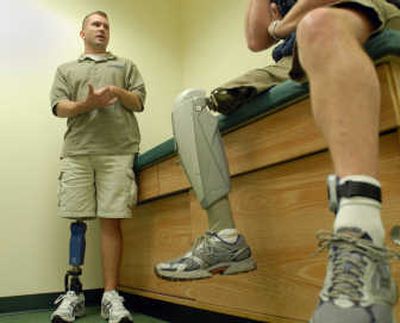Wars bind amputees and protesters

Michael McNaughton figures his boot must have brushed the side of a land mine five years ago at Bagram Air Base in Afghanistan.
He had been following in the footsteps of another soldier. An instant later, he lay maimed. Shrapnel ripped off his lower right leg, carved a divot in his left calf and severed two fingers.
While recovering, McNaughton met President Bush, who promised to one day run a mile with the Army sergeant. It took 14 months to arrive at the White House, providing an enduring image of America’s wars in Iraq and Afghanistan: amputee soldiers attempting to reclaim a sense of normalcy.
McNaughton told his story in Spokane Wednesday, on the fifth anniversary of the invasion of Iraq. He was in town to talk about the modern prosthetics offered by Hanger Inc. – technology that helped him run a half-marathon – more than 13 miles – in less than two hours.
But that event was not the Inland Northwest’s only reminder that the nation has been fighting since March 19, 2003, in Iraq and longer in Afghanistan. There were observances in churches and evening vigils in Spokane and Coeur d’Alene and a protest on the steps of the federal courthouse in Spokane, where participants staged a 1960s-style “die-in.”
Members of the largest Washington National Guard unit, meanwhile, continued preparing themselves to get back in the action. The state announced Wednesday that the Defense Departmentwill activate the 81st Heavy Brigade Combat Team in mid-August for a return to Iraq in the fall.
The unit, which includes 2,900 citizen soldiers from Washington and 900 from the California National Guard, will focus primarily on security and “force protection,” according to a press release from the Washington Military Department.
The 81st, which is headquartered in Seattle, served in Iraq from March 2004 to March 2005. The unit lost nine members during that deployment; they are among 3,978 U.S. American troops who have died in Iraq and Afghanistan since the war on terror began in 2001.
Those numbers prompted Wednesday’s quiet protests, including the one at the federal courthouse. About half the group sat or lay in front of the main Riverside Avenue entrance in a “die-in” that some expected would result in arrests for civil disobedience.
But there weren’t enough protesters to block all entrances, so security guards calmly monitored the peaceful protest as people entered and left the building through other doors.
When protesters began to leave, Rusty Nelson, of the Peace and Justice Action League of Spokane, invoked a phrase from a previous war, saying they would “declare victory and withdraw.”
Later Wednesday, at the Spokane vigil sponsored by MoveOn.org, the names were read aloud of the 82 Washington residents who have died in the Iraq war. With each name, a candle was extinguished.
“Five years and a million lives,” said Greg Lahti, a Spokane County resident. “It’s disgusting. Our tax dollars, all for – well, I don’t even know what for.”
MoveOn.org held similar vigils across the country. Spokane coordinator Melanie Vance said locals met at the site of a former homeless camp to emphasize that many homeless people are veterans.
“We wanted to make the connection that we already do not have the resources to deal with the veterans that we already have and yet we are continuing to create more,” Vance said. “It just speaks to the larger issue that we don’t have the resources to fight this war. We need to be investing in our own country.”
Among the returning soldiers have been 29,395 wounded. They include about 800 who – like McNaughton – have had limbs amputated. And while they’re vastly outnumbered by Americans who lose limbs from non-war causes like disease and accidents, it is the push to help veterans that is bringing advancements in the field, Dale Berry, Hanger’s vice president of clinical operations, said at his company’s event on Wednesday.
Some amputees are being fitted with computer-assisted prosthetics, like McNaughton’s $42,000 leg. Also at Wednesday’s event, Bill Dunham, whose right leg was shredded by “friendly fire” 19 years ago while parachuting into Panama with U.S. Special Forces, wore a $130,000 prototype leg that senses movement and reacts to help stand and climb stairs.
“You know the old adage that wars create development?” Berry said. “This is a classic case.”